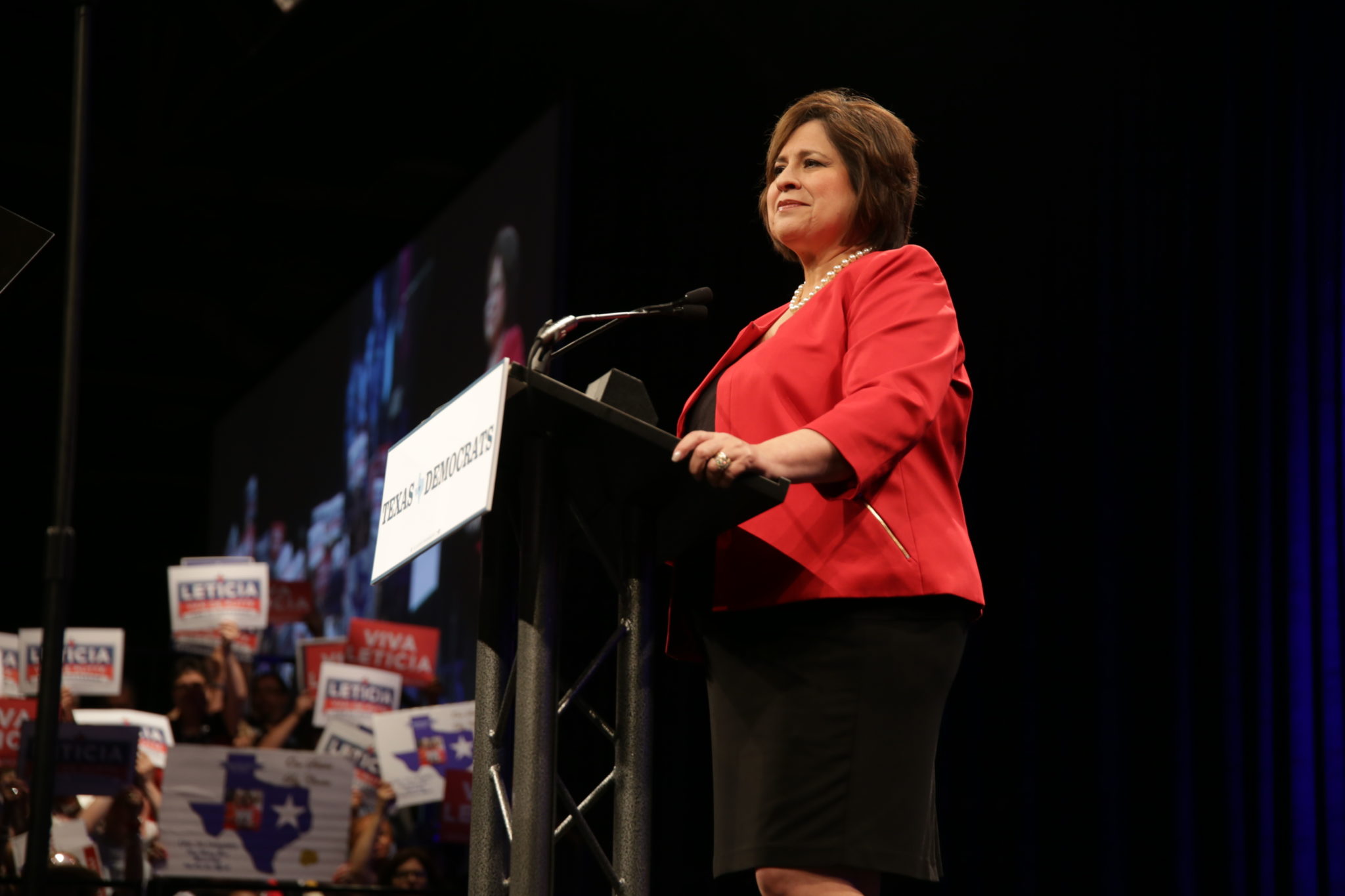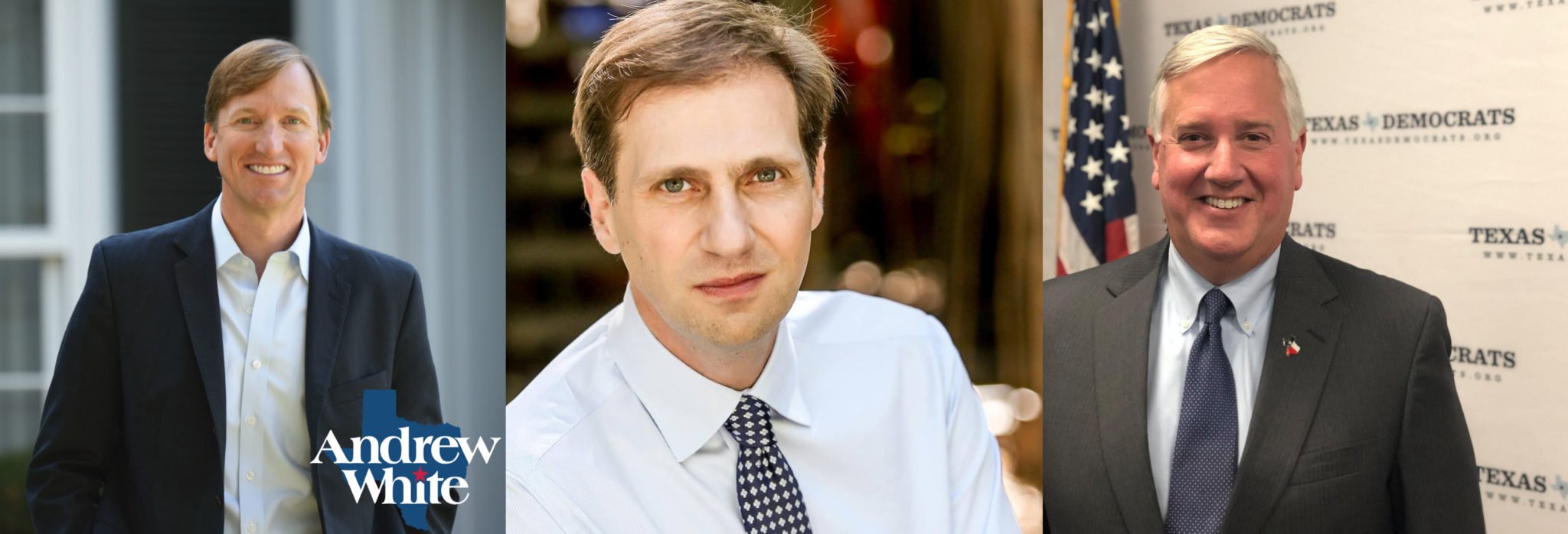
At State Convention, Democrats Seek a Revival
Texas Democrats enjoy a mostly controversy-free convention in Dallas.

Above: State Sen. Leticia Van de Putte speaks at the Democratic state convention on Friday night.
A Few Final Thoughts
Saturday, 7:05 p.m.
In the end, the few things that might have caused problems for the Texas Democratic Party at its convention in Dallas failed to materialize. Chair Gilberto Hinojosa was easily re-elected, fending off a quixotic challenge from a faction unhappy with the party’s direction. Terri Hodge, a former state Rep. convicted of failing to pay taxes on the bribes she collected in office, was denied a seat on the party’s leadership team. Though police were called to a meeting of the Hispanic caucus, where a dispute occurred between rivals vying to lead the group, the tiff resulted in no serious damage—to the people involved or the party.
A few delegates had wanted to see stronger language about immigration in the party platform, language that would be a rebuke to President Obama. That fight, too, was avoided, and the platform was adopted without controversy. The longest debate of the day, in fact, involved the distribution of paper copies of the resolutions—i.e., “fully fund public education”—that received voice votes.
A lot of Democrats will leave Dallas proud of certain items they say show party growth. Leticia Van de Putte, especially, wowed the crowd, with her speech on Friday night—and even her intro video.
But there were others. State Rep. Trey Martinez-Fischer spent a lavish amount of money at the convention, including a well-attended party Friday night with a 1980’s-themed cover band—and lived up to his reputation as a smart, capable brawler for the Democratic cause. Houston Mayor Annise Parker’s speech was another highlight, strongly delivered and well received, making it seem strange that she’s infrequently mentioned as one of the party’s future contenders.
Still, though, it’s hard not to compare the Democratic convention to the Republican one earlier this month. The GOP gathering featured three days of events and speakers, including national figures, and was remarkably well-attended—a result of the fact, of course, that the GOP wields almost total power in the state. In Dallas this weekend, it seemed as if some delegates showed up mid-day Friday and left early Saturday. Most speeches of note took place in a several-hour span that Friday night. And few stayed until the actual end of the convention.
Convention attendance isn’t a proxy for electoral performance, of course. But the impression left this weekend in Dallas is that the party remains in rebuilding mode.
Davis Rails Against ‘Insiders’
Friday, 11:10 p.m.
Wendy Davis’ speech was the last of the night, and it was the longest. She hit all the major points. She talked about her family, her background, Greg Abbott, her policy agenda. She talked about Texas history. She paraphrased former President Bill Clinton’s address to the LBJ library’s civil rights summit from a few months back. She spoke about her grandmother from Muleshoe, Texas, and she invoked the memory of Ann Richards, and she seemed to touch on just about everything in between.
Van de Putte’s speech, the night’s penultimate event, was the best: But if Davis’ wasn’t the best, it wasn’t the worst, either. She delivered it well, and though the crowd stayed seated through many of the biggest applause lines in the second half, they seemed to leave contented.
Most of Davis’ remarks were built around a dichotomy between Greg Abbott, the quintessential “Austin Insider” of rhetorical lore, and the ordinary, mythic hardworking Texan, the people that are “heading for their night shifts at the local plant,” who are “tucking in their sons and daughters with sweet lullabies,” and who are “trying to figure out how they’ll get a second job, how they’ll pay for their next course in school.” Davis drew upon her own history to argue she’d keep these people more in mind. She’d help build the “Texas of tomorrow,” while Abbott wanted to return to the past.
These are the same themes Davis has stressed in recent weeks on the campaign trail. They haven’t given her campaign much momentum or energy, and tonight’s speech seemed unlikely to change that.
Van de Putte Fires Up the Faithful
Friday, 9:40 p.m.
It’s hard to think of two more different speeches in Texas this election cycle than the speech Dan Patrick gave at the Republican convention in Fort Worth, and the one delivered by Leticia Van de Putte tonight at the Democratic convention in Dallas.
Patrick’s was insular. He spoke directly to the red-meat-demanding crowd in a language that they understood. He told them explicitly that he would be thinking of them, before others, if he took office.
Van de Putte’s speech was the opposite, an attempt to establish broad appeal. Some of it was well-trod material for a political speech: Her upbringing, her values, her family’s story, the American dream. But it’s remarkable how much the San Antonio state senator has improved as a stump orator since the beginning of the campaign. Both Davis and Van de Putte have improved, but the latter doubly so. She worked the crowd into a frenzy.
Privately, many Dems hold more hope for Van de Putte’s chances in November than they do for Davis’. Van de Putte will need to heighten people’s concerns about Patrick’s extreme views in the next couple of months—and she called out Dan Patrick, explicitly, many times tonight. “I’ve seen what Dan Patrick is capable of, and I’m not going to let him do that to this great state,” she said. “This is our children’s Texas. This is our grandchildren’s Texas. This is our Texas.”
Patrick, Van de Putte said, “offers a vision of Texas with less opportunity than the generations that came before us.”
In the governor’s race, Davis and Abbott’s personal styles have been more similar than different. Both come off somewhat studied when delivering speeches. Both seem somewhat reserved. Both have been playing a somewhat defensive game on the trail.
Patrick and Van de Putte, meanwhile, will be going at each other’s throats. That seems to be the only way Patrick knows how to campaign, but we haven’t seen as much of that from Van de Putte. Based on tonight’s speech, we should expect that she can handle it.
The Caucus Meetings Get Lively
Friday, 8:11 p.m.
In recent years, caucus meetings at Democratic state conventions have been relatively placid affairs. With the party in constant retreat, there has been less incentive to fight for influence within it. That dynamic’s changed a bit this year. Party members “see Democrats winning elections in the next couple cycles,” said a member of the party’s executive committee, “and they want a piece of that.” The greater participation, along with changes to the party’s structure over the last couple of years, has led to a few fissures.
Democrats talked up the sizable attendance of a meeting this morning of the party’s Women’s Caucus, which in previous years had seen sparser participation. One senate district featured five people running against each other for a position on the party’s executive committee. A meeting of the Hispanic Caucus featured a chaotic tug-of-war between two officers over who would chair the meeting, and at the party’s Black Caucus meeting this afternoon, a lively three-way vote to elect the party’s vice chairwoman resulted in the party dodging a bullet: former state rep. and convicted felon Terri Hodge was easily denied the leadership position.
Then there’s the battle for overall leadership of the party: Incumbent party Chair Gilberto Hinojosa is contending with Rachel Barrios-Van Os in this year’s race. The two ran against each other in 2012, too, and since then Hinjosa has been trying to modernize the party, hiring staff and making changes to the way Texas Democrats govern themselves. Those efforts have been controversial in some quarters, and though Hinojosa is unlikely to lose, the share of the vote Barrios-Van Os wins could be taken as a referendum on the party’s direction.
There’s also a Republican Convention-style platform fight brewing. Some Democrats have been advocating for platform provisions that implicitly criticize President Obama’s immigration and deportation policies, and some in the party are anxious to keep it out.
Some of the tussles could be alternately framed as evidence of dysfunction. But for some Democrats, it’s the party returning to normalcy.
Texas Democrats Need a Fresh Start
Friday, 11:45 a.m.
Texas Democrats come to their 2014 state convention in Dallas this weekend with a couple of difficult tasks before them. The convention kicked off Thursday night, a year and a day after the filibuster that seemingly turned state Sen. Wendy Davis into the political contender Democrats needed. But in the year since, the party, and her campaign, has had to contend with the prosaic reality that the party’s political apparatus, having atrophied for years, still has a way to go before it returns to fighting shape.
The Davis campaign has struggled to retain the affection of supporters while making the kinds of political calculations they think are necessary to swing the race for governor. After a series of early missteps, the campaign had seemed to stabilize a bit early in 2014—but a narrative about the campaign’s unreadiness has set in, and wasn’t helped by a recent change in leadership. There have been difficulties managing the organizational relationships between the campaigns, the party and Battleground Texas. At the moment, Davis’ chances of winning—as well as the prospects for the Democrats other statewide candidates—don’t look promising.
So a lot of Democrats will be hoping to hit the refresh button at the convention. And many here temper realism with optimism. They take the long view. The party’s leading lights will speak Friday and Saturday—the party faithful will rally round and try to recapture some of the energy they felt around this time last year.
Still, Davis won’t have long to do it. She skipped the first day of the convention to attend to the death of her stepfather, and sent surrogates to the opening night parties around the Dallas Convention Center. She’s addressing the convention Friday night, around 8:50 p.m.—too late for the first round of local news shows, and just before the weekend, when a lot of people tune out of news altogether. On Saturday, we’ll have a few more speakers, and then the delegates will disperse and the general election season, sure to be brutal, will begin in earnest.


